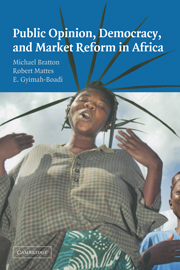Conclusions
Published online by Cambridge University Press: 15 December 2009
Summary
Some say there is little new under the African sun. After all, Africa's semidemocracies and informal economies are actually mixtures of old and new. The family tree of African regimes includes not only colonial rule — which sought to restrict popular politics to a traditional realm and acknowledged minimal state responsibility for public welfare — but also one-party hegemony — which aimed at the opposite: periodic electoral mobilization and planned social transformation. Between these extremes, and overlaid recently with a thin veneer of liberalizing reforms, lie the hybrid systems of Africa today.
Contrary to the view that nothing ever changes in Africa, our study of public opinion challenges sacrosanct assumptions about Africans and their beliefs. We find, for example, that Afrobarometer respondents understand democracy in largely liberal and procedural terms; that popular demand for democracy depends more on the delivery of political rights than on economic performance; that a majority of people extend conditional support to the principle of market pricing for consumer goods and public services; that occupational identities are supplanting ethnic identities in many places; that Muslims are no less supportive of democracy than non-Muslims; that national identity is strong almost everywhere on the continent; and that the Africans we interviewed base their political judgments more on rational calculation than on group loyalty. As their awareness of public affairs increases, and based on their own adult experiences, Africans are learning about reform.
- Type
- Chapter
- Information
- Public Opinion, Democracy, and Market Reform in Africa , pp. 343 - 354Publisher: Cambridge University PressPrint publication year: 2004

